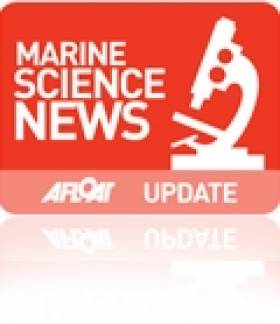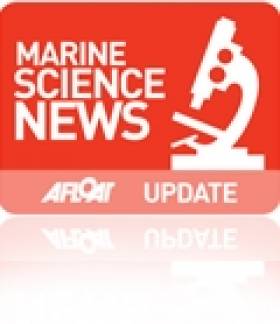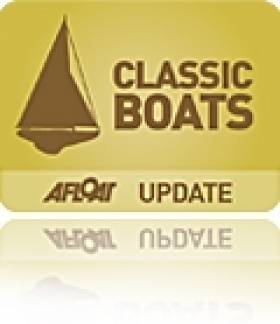Displaying items by tag: John Philip Holland
#MarineScience - Following its issue by the Central Bank last year, the limited edition Silver Proof coin commemorating John Philip Holland, the Irish-born inventor of the modern submarine, was presented to Taoiseach Enda Kenny and Marine Minister Simon Coveney during their recent visit to the Marine Institute.
Highlighting the significance of Ireland's strong maritime history, Marine Institute CEO Dr Heffernan explained how this country "is at the cutting edge of international marine research driving ocean discovery and exploration.
"Supporting the Irish-led first transatlantic mapping survey from Newfoundland to Galway this coming month [June 2015], the Marine Institute's national research vessel RV Celtic Explorer will be using its extensive multibeam sonar equipment mapping parts of the Atlantic seabed."
Dr Heffrnan added: "The oceans are the life support system of our planet – producing half the oxygen we breathe; providing us with a wealth of resources including food, minerals and energy; as well as affecting our moderate climate in Ireland. It is essential that we continue to improve our understanding of how the ocean impacts our live."
By 2020, in partnership with the Atlantic Ocean Research Alliance between the EU, Canada and USA which was established by the signing of the Galway Statement in 2013, Dr Heffernan says "we aim to be able to predict the major risks and changes in the dynamics of the Atlantic Ocean.
"Just as John Philip Holland set out to discover the depths of the sea over one hundred years ago, we continue this quest of discovery and innovation through advanced technology."
Central Bank Issues Commemorative Coin in honour of Irish Submarine Inventor John Philip Holland
#submarine – The Central Bank of Ireland launched today a €15 limited edition Silver Proof collector coin to commemorate John Philip Holland [1841 - 1914], the Irish born inventor of the modern submarine.
Speaking at the launch at the Marine Institute, Oranmore, Galway, Central Bank Director of Currency and Facilities Management, Paul Molumby said: "This is the first in a new series that the Central Bank will issue to honour Ireland's impressive scientific and technological tradition. John Philip Holland's life and achievements were extraordinary. He played a significant role in the development of submarine navigation and following his emigration to the USA, he designed the first working submarine."
Dr Peter Heffernan, CEO Marine Institute said: "We're delighted to host the launch of the Central Bank's commemorative coin here today to honour John Philip Holland, the Irish born inventor of modern submarine. As a nation we have a strong tradition of innovation and we at the Marine Institute are very proud to maintain that link with the history of marine technology - we named our remote operated vehicle (ROV) after John Philip Holland the Irish born inventor of modern submarine.
With the ROV Holland I, we honour his legacy through important recent scientific discoveries such as the surveys of mid-Atlantic volcanic vent fields and the unique new animal communities on the deep canyons on our continental slope, as well as working on crucial fisheries, environmental and climate changes missions and assisting in the development of new marine sensor technologies.
This event would have also been well received by the late Commander Bill King who lived in Oranmore, Galway. Commander King had commanded the submarine Snapper during World War II, in which he won the DSO and DSC while patrolling the coast of Norway. In his later years he frequently addressed meetings urging people to seek adventure in their lives, particularly having joined the Royal Navy at a young age of 13.
The coin features a representative image of the inventor's hand poised to place the final stroke of a technical drawing of the USS Holland, complete with a decorative nautilus spiral with the obverse bearing the traditional representation of the Irish harp. The coin, which was designed by Mary Gregoriy, is part of the Irish Science and Inventions coin series, and has an issue limit of 10,000 units.
The Holland coin will be available to the public from Tuesday 2nd September 2014. Coins can be purchased by downloading an order form from www.centralbank.ie, by phoning 1890 307 607 or directly from the Central Bank on Dame Street in Dublin at a cost of €44.
Drogheda's Tribute To Submarine Pioneer John Philip Holland
#Historic - Last weekend saw the unveiling in Drogheda of a sculpture of the Fenian Ram, the first successful submarine whose designer was connected with the town.
As The Irish Times reports, the modern submarine was pioneered by John Philip Holland, who worked as a teacher in the Boyne-side town before emigrating to the States and developing his submersible ideas for the US Navy.
The rest is history, as Holland's designs formed the basis of all modern submarines we know today.
Strangely enough, his story is entwined with that of another Irishman, Louis Brennan, who invented the world's first practical guided torpedo.
Holland died just weeks before the HMS Pathfinder became the first ship to be sunk by a submarine-launched underwater missile.
But his legacy is not all destruction, and better exemplified by the exploration work being done in the Whittard Canyon by the Marine Institute's unmanned submersible ROV Holland I, named for one of the Irishman's early submarine prototypes.
The Irish Times has more on the story HERE.


























































